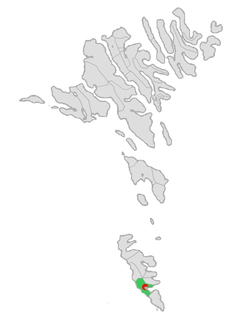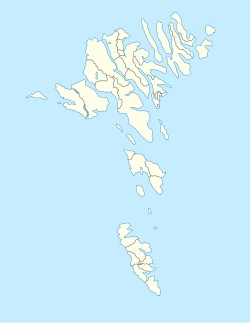Vágur
|
Vágur Våg |
|
|---|---|
| Municipality and village | |
 |
|
 Location of Vágs kommuna in the Faroe Islands |
|
| Location of Vágur in the Faroe Islands | |
| Coordinates: 61°28′31″N 6°48′26″W / 61.47528°N 6.80722°WCoordinates: 61°28′31″N 6°48′26″W / 61.47528°N 6.80722°W | |
| State |
|
| Constituent country |
|
| Island | Suðuroy |
| Government | |
| • Mayor | Dennis Holm |
| Population (2010) | |
| • Total | 1,361 |
| Time zone | GMT |
| • Summer (DST) | WEST (UTC+1) |
| Postal code | FO 900 |
| Climate | Cfc |
| Website | Official homepage |
Vágur meaning Bay (Danish: Våg) is a town on the island of Suðuroy, part of the Faroe Islands
It is situated on the east coast of the island on the Vágsfjørður fjord, and was founded in the fourteenth century. Expansion has meant that the nearby town of Nes is now a suburb of Vágur. Vágur has a sports hall next to the football grounds on Eiðinum, near Vágseiði, a swimming pool by the school and a clinic which offers the services of doctors, nurses and dentists. There is also a hotel, one bank and various shops.
The port area, which is 14 m in depth, is situated on the northern part of the fjord. The port authorities can offer services of piloting (lods), water and fire-fighting, and in connection with the harbour there is a modern fish factory and auctioneers for fish. Salmon farming is also a part of the fish industry in Vágur, this includes salmon farm rings on the fjord and in other places near the east coast of Suðuroy and a salmon factory. The town has a slipway, a fleet of fishing vessels and a filleting factory.
Memorial in memory of Royndin Fríða, which was built here in 1804, the first Faroese ship since Middle Ages
The old school, houses and boat houses in Vágur
Wooden row boats from Vágur on Vágseiði, the oldest one was built in 1872
Dryfish work in Vágur 1907
Typical dramatic light scenery in the Faroe Islands: The town of Vágur, winter 2004
There is a memorial near the main road through Vágur commemorating the efforts of Nólsoyar Páll, the nineteenth-century poet and captain of Royndin Fríða (Beautiful Trial). He believed that the monopoly trading scheme was seriously restricting the economic potential of the Faroe Islands and set about organising opposition and resistance to it. Although he failed to abolish the monopolies, his actions were the start of a process which eventually led to the abolition of monopoly trading in 1856. The memorial was erected in memory of the fact that in 1804 on this spot, now called Fløtan Fríða, the first Faroese ship since the Middle Ages was built. The text on the memorial says: "Her á Fløtuni Fríðu bygdu Nólsoyar Páll, Jákup bóndi í Toftum, Per bóndi í Gjørðum og aðrir í 1804 Føroya fyrsta skip Royndina Fríðu." - "Here on Fløtan Fríða Nólsoyar Páll, Jákup bóndi í Toftum (a farmer from Toftir in Vágur), Per bóndi í Gjørðum (a farmer from Gjørðum in Porkeri) and others built the first Faroese ship, Royndin Fríða."
...
Wikipedia

